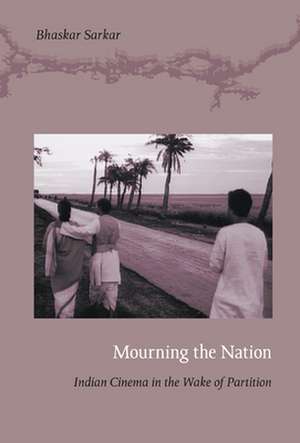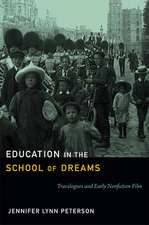Mourning the Nation – Indian Cinema in the Wake of Partition
Autor Bhaskar Sarkaren Limba Engleză Paperback – 19 mai 2009
Preț: 306.00 lei
Nou
Puncte Express: 459
Preț estimativ în valută:
58.55€ • 61.13$ • 48.46£
58.55€ • 61.13$ • 48.46£
Carte tipărită la comandă
Livrare economică 04-18 aprilie
Preluare comenzi: 021 569.72.76
Specificații
ISBN-13: 9780822344117
ISBN-10: 0822344114
Pagini: 384
Ilustrații: 63 illustrations
Dimensiuni: 168 x 233 x 25 mm
Greutate: 0.61 kg
Editura: MD – Duke University Press
ISBN-10: 0822344114
Pagini: 384
Ilustrații: 63 illustrations
Dimensiuni: 168 x 233 x 25 mm
Greutate: 0.61 kg
Editura: MD – Duke University Press
Recenzii
Centered on the simultaneous repression and representation of Indias Partition, arguably the defining event of modern South Asian studies, Mourning the Nation provides the most sophisticated theoretical approach to Indian cinema to date. It will be impossible for future work on Indian popular culture not to reckon with Bhaskar Sarkars text, and its broadly suggestive discourse of mourning, loss, and trauma will extend its relevance to scholars from disciplines and areas with little direct interest in Indian film.Corey K. Creekmur, co-editor of Cinema, Law, and the State in AsiaMourning the Nation argues for the profound and lasting imprint left by Partition on Indias post-independence culture. Bhaskar Sarkar analyzes films for traces of broken families, dispersed lives, and restless destinies. Taking the reader along unconventional routes and settling on metaphorical sites for his excavation, he never produces less than stimulating arguments. And he provides the reader with a lively entry point for considering how current changes in the Indian economy and polity since globalization have brought some of these crucial issues back into public debate in distinctive ways.Ravi S. Vasudevan, editor of Making Meaning in Indian Cinema
Notă biografică
Textul de pe ultima copertă
""Mourning the Nation" argues for the profound and lasting imprint left by Partition on India's post-independence culture. Bhaskar Sarkar analyzes films for traces of broken families, dispersed lives, and restless destinies. Taking the reader along unconventional routes and settling on metaphorical sites for his excavation, he never produces less than stimulating arguments. And he provides the reader with a lively entry point for considering how current changes in the Indian economy and polity since globalization have brought some of these crucial issues back into public debate in distinctive ways."--Ravi Vasudevan, editor of "Making Meaning in Indian Cinema"
Cuprins
Descriere
Traces how the traumatic Partition of India and Pakistan has been represented (or not represented) in Indian cinema from 1947 to the present










